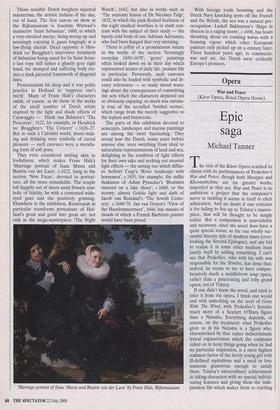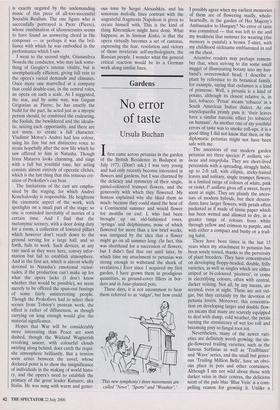Opera
War and Peace
(Kirov Opera, Royal Opera House)
Epic saga
Michael Tanner
The visit of the Kirov Opera reached its climax with its performances of Prokofiev's War and Peace, though both Mazeppa and Khovanshchina are far greater works, imperfect as they are. War and Peace is so ambitious a project that the composer's nerve in tackling it seems in itself to elicit admiration. And no doubt if one criticises it for failing to live up to Tolstoy's master- piece, that will be thought to be simply unfair. But a comparison is unavoidable and necessary, since the novel does have a quite special status, as the one wholly suc- cessful literary epic of modern times (over- looking the Second Epilogue), and any bid to realise it in some other medium must justify itself by adding something. I can't see that Prokofiev, who with his wife was responsible for the libretto, has done that; indeed, he seems to me to have compre- hensively made a middlebrow soap opera, rather than a penetrating and lofty grand opera, out of Tolstoy.
If one didn't know the novel, and tried to infer it from the opera, I think one would end with something on the level of Gone With The Wind, with Prokofiev's heroine much more of a Scarlett O'Hara figure than a Natasha. Everything depends, of course, on the treatment: what Prokofiev gives us in his Natasha is a figure who, characterised by that rather indiscriminate lyrical expansiveness which the composer relied on to keep things going when he had no particular inspiration, is a mere highest common factor of the lovely young girl with ill-defined aspirations and a need to love someone glamorous enough to satisfy them. Tolstoy's extraordinary achievement in taking characters with no special individ- uating features and giving them the inde- pendent life which makes them so startling is exactly negated by the undemanding music of this piece of all-too-successful Socialist Realism. The one figure who is successfully portrayed is Pyotr (Pierre), whose combination of idiosyncrasies seems to have found an answering chord in the composer — or perhaps it was the bril- liance with which he was embodied in the performance which I saw. I went to the second night, Gianandrea Noseda the conductor, who may lack some- thing of Gergiev's intense vitality, but is unemphatically efficient, giving full rein to the opera's varied demands and climaxes. Once more one marvelled at a company that could double-cast, in the central roles, an opera on such a scale. As I suggested, the star, and by some way, was Gegam Grigorian as Pierre; he has exactly the build for the part, he acted just as a myopic person should, he combined the endearing, the foolish, the bewildered and the idealis- tic, seizing each opportunity, and there are not many, to create a full character. Vladimir Moroz's Andrei had less colour, using his fine but not distinctive voice to strain hopefully after the new life which he saw offered to him in Natasha. Though Irina Mataeva looks charming, and sings with a full but youthful tone, her acting consists almost entirely of operatic clichés, which is the last thing that this tenuous cre- ation of Prokofiev's can bear.
The limitations of the cast are empha- sised by the staging, for which Andrei Konchalovsky is responsible. He heightens the cinematic aspect of the work, with spotlights on a small part of the stage; so one is reminded inevitably of movies of a certain time. And I find that the metonymic scenery, with a door doing duty for a room, a collection of lowered pillars which however don't reach down to the ground serving for a large hall, and so forth, fails to work. Such devices, at any rate used as they were here, convey infor- mation but fail to establish atmosphere. And in the first act, which is almost wholly devoted to Natasha's emotional vicissi- tudes, if the production can't make up for what the opera lacks (I don't know whether that would be possible), we seem merely to be offered the spun-out fussings of some fairly uninteresting people. Though the Prokofievs had to select their scenes from Tolstoy's protean work, the effect is rather of diffuseness, as though carrying on long enough would give the material significance.
Hopes that War will be considerably more interesting than Peace are soon dashed, though the Wieland Wagnerish revolving saucer, with colourful clouds swirling along behind, does catch the requi- site atmosphere brilliantly. But a tension soon arises between the novel, whose declared point is to show the insignificance of individuals in the making of world histo- ry, and the opera's need to establish the primacy of the great leader Kutuzov, aka Stalin. He was sung with warm and gener- ous tone by Sergei Alexashkin, and his sonorous melodic lines contrast with the ungrateful fragments Napoleon is given to create himself with. This is the kind of thing Khrennikov might have done. What happens, as in Semyon Kotko, is that the opera virtually becomes a set of cantatas, expressing the fear, resolution and victory of those inveterate self-mythologisers, the Russian people. I wonder what the general critical reaction would be to a German work along similar lines.



























































 Previous page
Previous page